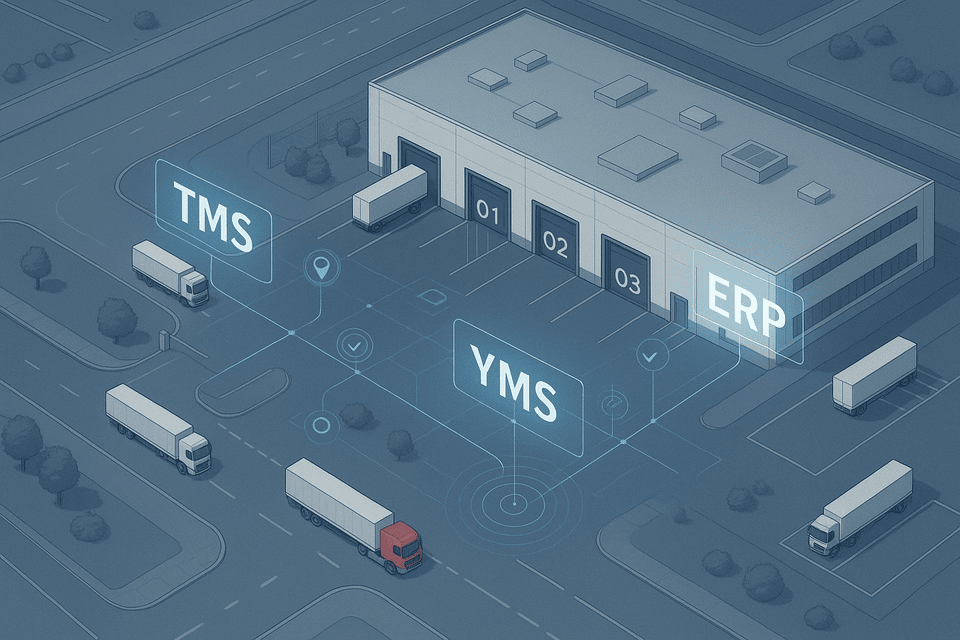Jun 5, 2025 Zdravka Ley
ShareThe yard is much more than just an area behind the factory gate. It is the operational gateway for incoming materials and at the same time the starting point for outgoing deliveries. As the first and last physical point of contact in the logistics chain, yard management plays a key role in determining efficiency, transparency and adherence to delivery dates and has a decisive influence on the entire supply chain.
Many companies rely on individual standalone solutions, for example time slot allocation, automated entry at the gate or ramp control. However, a yard management system can only be fully effective if it is integrated across system boundaries. The reason is that yard processes do not stand alone, but are closely connected to upstream systems such as transport management (TMS), production planning (ERP) or warehouse management (WMS). Only when this information flows together does the basis for really intelligent yard management in real time emerge.
Why standalone solutions are not enough
Typical yard processes are often mapped by individual systems. The gate is controlled separately from the time slot portal, the ramp is coordinated by telephone, trailer movements are carried out by call. This fragmentation leads to a lack of transparency, errors and high coordination costs. Even minor disruptions have an extreme impact if the systems and players involved are not networked. The result: traffic jams, missed slots, frustration among drivers and operational teams.
Yard management control begins where ERP, WMS and TMS end
ERP, WMS and TMS are central tools for planning and controlling procurement, production, warehousing and transport. They provide valuable information on expected arrivals, freight or planned production requirements.
However, the yard not only needs a planning level, but also its own operational control level that can react flexibly to deviations: Trucks that arrive too early or too late must be prioritized, waiting spaces allocated efficiently and ramps assigned dynamically. A yard management system (YMS) takes on precisely these tasks - in real time, rule-based and automated. It closes the gap between planning and day-to-day management and provides operational control where traditional planning systems stop. Without this control, potential remains unutilized: idle time, stressed employees and inefficiently used resources.
Optimization of yard activities with SYNCROSUPPLY
A modern yard management system unfolds its full potential in intelligent optimization. It continuously analyzes data from transport, storage and production systems, takes current yard statuses and dynamic priorities into account and controls the entire delivery process in a highly automated manner. Decisions such as the allocation of ramps, the integration of the trailer yard or the utilization of buffer areas are no longer made manually or reactively, but are data-based, predictive and situation-dependent.
This is made possible by the use of optimization algorithms and AI, which calculate new schedules in real time when situations change, for example in the event of delays or rescheduling at short notice. This turns a yard management system into not just a control tool, but an active optimizer that speeds up processes, makes better use of resources and ensures long-term process stability.
SYNCROSUPPLY from INFORM was developed with precisely this aim in mind: an intelligent, networked platform for integrated yard management.
Conclusion
Yard management must be understood as an integral part of the logistics chain. It is not just about transparency or coordination, but about active optimization. A modern yard management system recognizes bottlenecks, evaluates options for action and proactively makes adjustments. It utilizes data from various sources and offers recommendations for action in real time. In this way, the system becomes an adaptive decision-making authority that continuously improves processes before any congestion or idling occurs. A modern yard management system is more than just an intelligent control system. It becomes an intelligent link between planning and reality.
How do you currently integrate your yard management processes?
About our Expert

Zdravka Ley
Marketing Manager
Zdravka Ley started working for INFORM in 2002 and is focused in topics around the optimization and sustainability of delivery and internal transport logistics.



